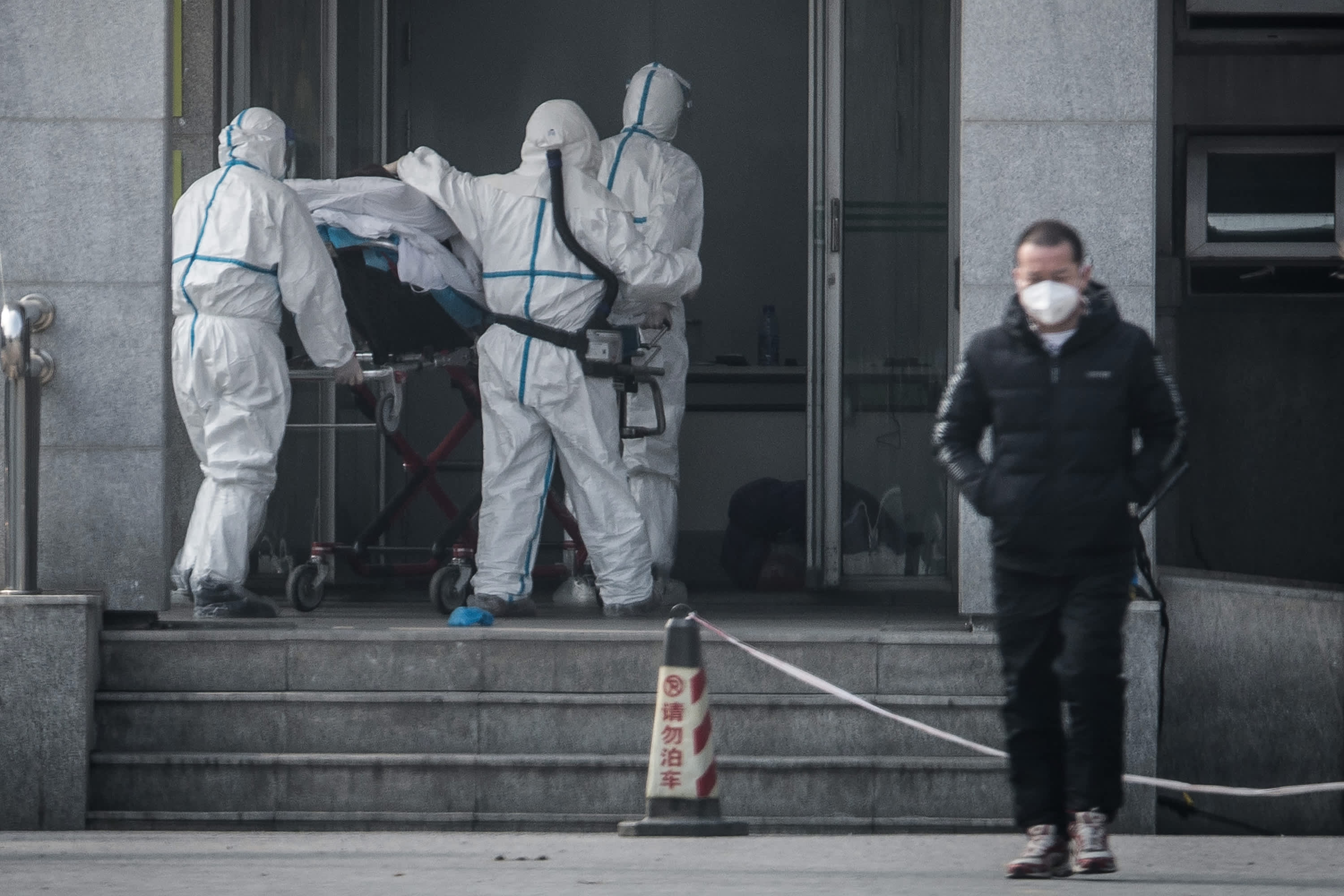Medical staff members carry a patient into the Jinyintan hospital, where patients infected by a mysterious SARS-like virus are being treated, in Wuhan in China’s central Hubei province on January 18, 2020.
STR
The outbreak of a new coronavirus stemming from Wuhan, China has killed four people with confirmed cases totaling more than 200 ahead of the massive Lunar New Year holiday during which hundreds of millions of people are expected to travel.
Late Monday, China’s authorities confirmed that the virus can pass from person to person.
The outbreak could hit the economy, experts warned as they called back to the fallout from the deadly Severe Acute Respiratory Syndrome (SARS) crisis in 2003.
The Wuhan virus — what it is and where it started
The coronavirus, which causes a type of pneumonia, was thought to have first originated at a wholesale seafood market in the Chinese city of Wuhan. It was first reported in late December.
The World Health Organization said it appears the outbreak began in an animal source.
On Sunday, China’s National Health Commission said the source of the virus remains unknown and that its transmission path hasn’t been completely traced.
As of Monday evening, the number of confirmed cases in China stood at 218 — with 198 in Wuhan — and four known deaths. Authorities also confirmed five cases in Beijing, and one case in Shanghai, and 14 in the Guangdong province.
Cases have also been reported in Thailand, South Korea and Japan. Symptoms include a fever and difficulty in breathing, and there is no vaccine for this new virus yet.
The outbreak comes ahead of the Lunar New Year holiday period this week, when millions of Chinese will travel domestically and overseas — heightening the risk of more transmissions.
The WHO said it will convene an emergency committee on the virus on Wednesday.
Comparison with SARS
The outbreak has sparked alarm because the disease is in the same family of viruses as SARS.
SARS, a severe epidemic which emerged in China in 2002, killed nearly 800 people worldwide. It hit Asian cities such as Hong Kong, Singapore, Taipei and Beijing the hardest and triggered a severe downturn in the region.
“I remember the SARS outbreak very, very clearly and the impact it had. These things have an enormous hit on economies,” said Rob Carnell, Dutch bank ING’s chief economist, adding that some countries even slipped into recession.
“It is not inconceivable that if Wuhan becomes more widely spread, and starts to claim more lives, that it will result in a similar response,” added Carnell.
At the time, the rapid spread of SARS was blamed on a lack of transparency by the Chinese authorities. In an opinion editorial published Sunday, state tabloid Global Times wrote, “In the early moments of SARS, there was concealment in China. This must not be repeated.”
This time, however, experts say China has moved more rapidly to deal with the crisis and also said that the virus appears to be less fatal than SARS.
Chinese President Xi Jinping said on Monday that containing the spread of the coronavirus should be a “top priority,” according to state media.
“Government and World Health Organization reports indicate that the virus is both less virulent and less deadly than SARS. The response from Beijing is also far faster this time than it was in 2002-04,” said Rory Green, economist for China and South Korea at research firm TS Lombard.
Impact on economy
ING’s Carnell warned that if consumers get spooked, the impact on the economy could be significant.
“Things like this … stop people from undertaking economic activity. You don’t go out. You don’t travel. You don’t eat out … You don’t even need lots of people to die or even get sick. You just need people to be worried about that to have a very very massive impact, and potentially quite a long-lasting impact, ” he warned.
He pointed to SARS as an example: Tourists stopped traveling to places where there were outbreaks, commuters stopped taking public transport and worked from home instead, and consumers stayed away from malls and restaurants.
At the peak of SARS, TS Lombard’s Green noted, domestic tourist growth in the second quarter of 2003 fell 45% year-on-year, and revenue from that activity plunged 64%.
He said, however, that the impact this time round should be less than that of SARS, given that it seems to be less virulent.
“Given the Wuhan coronavirus is less serious and the government response has been faster and stronger, the impact on the economy will certainly be less than SARS,” he added. “At present our outlook is for the disease to drag on retail sales and tourism but for consumption growth to remain on trend at 7%.”
